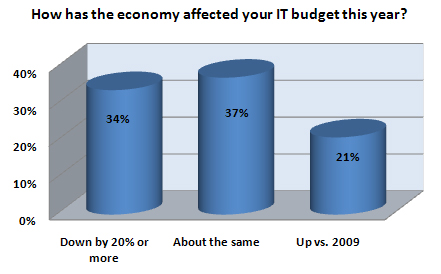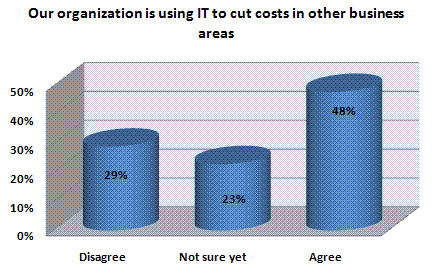Original URL: https://www.theregister.com/2010/03/24/vendor_preference_survey/
Reg readers feel the squeeze in 2010 IT budgets
Calling all belt-tighteners - how is it for you?
Posted in Channel, 24th March 2010 12:02 GMT
Preliminary results from our 2009/10 x86 Vendor Preference Survey show that the economy has had a considerable impact on IT spending among our survey respondents. While this is perhaps a self-evident finding, it gives us some data to hang our hats on.
We stress that these results are tentative, as the survey is still out in the field and could well change as more responses are received. But we also wanted to share a bit of interesting data and maybe even induce more of you to take the survey. [Click here to get started.]
The first graph shows a summary of how respondents answered a set of questions asking how their 2010 budget has fared in these troubled economic times. (The results won’t total 100 per cent, because we’re just showing the number of people who agreed with particular statements that were posed in three separate questions.)

As you can see, the number of respondents who have seen their budgets slashed by more than 20 per cent is quite large: 34 per cent. We actually expected this number come in around 25 per cent or so.
To give a little more detail on the “Down 20 per cent or more” result, another 12 per cent of our respondents on that question said that they weren’t sure about their 2010 budget even now – signalling that there might be future cuts, pushing them over the 20 per cent hurdle. But more than half (54 per cent) were certain that they wouldn’t take this type of hit.
We saw roughly the same results on the “2010 budgets about the same” question: 37 per cent of respondents said their budgets will remain about the same, but an additional 15 per cent weren’t sure that their 2010 budgets are stable yet. The remainder (48 per cent) said that they had taken a significant budget hit this year.
There was much more certainty on the “Budgets up vs 2009” question; 21 per cent said their budgets were rising, while 65 per cent were sure that they won’t get more money this year compared to 2009.
We also received quite a few good responses to a qualitative question we asked about cost-cutting. We worded the question in such a way as to give respondents an opportunity to either vent frustration or tell us about stupid/funny cost-cutting measures in their organiations – and we got plenty of stuff in both categories.
There are subtle changes to some of the responses in order to remove any identifying characteristics, but the important points remain intact.
On the cost-cutting side, there were many variations on the ‘spending freeze’ theme:
Cancel all spending non-project related, including capacity growth…
Budget approvals based on last year's usage, not this year's needs.
We’re also seeing a lot of responses that allude to data center folks being forced to wear more hats:
Probably the worst thing they have done is cut the Helpdesk staff and put their duties on system administrators. A sure fire recipe to create a BOFH is to make people who are already trying to wrap their heads around Microsoft's latest idiocy in Server 2008 or Exchange 2010 help the person who thinks editing a plain text file (the Windows hosts file) is "serious stuff".
"If there's a harder way, we'll find it"
Other comments included:
As staff leave they are not replaced, except management - they are always replaced.
We have had to lay off all temporary contractors- even those whose presence is required to finish the projects which will in actuality lower our staffing and budgetary needs.
These kinds of cuts can be self-defeating, to be sure, and we received plenty more examples of short-term savings that will almost certainly result in higher costs or worse business results down the road:
The president of the company thinks he's a fairly technically savvy guy. From one sentence to the next he says, ‘I want to put this new application in the cloud computing realm, but the data can't leave the country, and I want it to have five nine's uptime. Oh and do you think we can use those pizza box servers we've just retired?’ These 'pizza box' servers are 6 year old **** garbage that were decommissioned for very good reasons.
We have decided to move our equipment 900 miles south where the electricity is cheaper, the move will cost millions but we will save thousands.
Some of the comments were downright scary…
Less redundancy. When our primary sever failed, we switched to our backup, but never repaired or replaced the primary, leaving us without a backup.
…while others were plaintive:
How about no budget for IT? Things are fixed by cannibalization or emergency purchases. We have re-purposed half the equipment to get more from what we have. We have switched to GNU/Linux on the server and use the server to provide Debian desktops to the slow XP machines using xrdp. We have not enough RAM and storage. We even moved drives from one server to another. Requests for RAM and storage have gone unanswered. I suppose there might be hope for a 2010 budget but I see no light at the end of the tunnel.
I am using standard PCs for some services like cloning, mainly because there is not enough storage on the proper server. Apart from cannibalization, the only spares I have is some cable and connectors, CD drives and floppies. I have no Ethernet cards, wireless access points (on which we depend), or disc drives in case of failure. I am using storage on the server with an incomplete tape backup. I do not even have blank tape…
Thanks for letting me vent. I needed that.
We also asked whether respondents’ organisations are using IT to cut costs overall and, as you can see from the chart, about half of our respondents agreed that this was the case. One respondent reported:

My company is privately-owned, so they have maintained a rather even keel on dumb things to save money. Bonuses and raises were nonexistent and the 401(k) match was zeroed, and may not come back for awhile. And we're being packed into clustered-desk work areas to reduce rent, but I'm a software engineer who went hired-gun last year so I'm used to being well-paid and shittily-officed and it's not a big deal.
We did receive some positive feedback on management moves. This one was probably the best so far:
I'm actually quite impressed by our executive management, they tend to go for IT systems that improve services and reduce risk. Not that they don't consider cost issues, but that isn't the primary driver.
Many of the answers were pretty funny, and we’ll throw together a posting with those soon – we all need as many laughs as we can get during these tough times. But we’ll leave you with this one. Presumably it’s their data centre or corporate mission statement…
If there is a harder way, we'll find it. There is no reason, it’s just our policy!
The survey covers a wide range of issues ranging from server spending to virtualization to facilities concerns, but at the heart of it is an attempt to understand how real-world customers view the major x86 server vendors, and how the vendors compare on various technology and support criteria. We’re still running it, so if you’re someone who is intimately involved (in a clean way) with x86 server management or selection in your organization, we’d love to hear what you have to say.
We guarantee your anonymity and won’t try to sell you anything. You can check out the survey here. ®